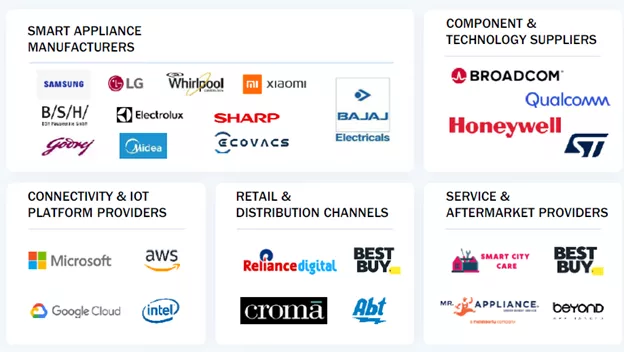The global industrial software market was valued at USD 21.5 billion in 2024 and is estimated to reach USD 46.6 billion by 2029, registering a CAGR of 16.7% during the forecast period.
The industrial software market is being propelled by the rapid adoption of digital transformation technologies, including IoT, AI, and cloud computing. This shift facilitates improved operational efficiency and predictive maintenance in manufacturing, energy, and other industries. Emerging trends include the integration of AI for advanced automation and using digital twins for simulation and optimization. Disruptions are primarily due to the increasing need for cybersecurity, the challenge of legacy system integration, and the rise of new market entrants offering innovative, cost-effective solutions.
The rapid adoption of Industry 4.0 and 5.0 technologies in manufacturing and process industries is revolutionizing the industrial software market. Industry 4.0, characterized by integrating IoT, AI, and data analytics, enhances automation, operational efficiency, and real-time decision-making capabilities.
Download Latest Updated PDF Copy:
https://www.marketsandmarkets.com/pdfdownloadNew.asp?id=27555137
Based on region, Asia Pacific is projected to grow fastest for the industrial software market.
The industrial software market in Asia Pacific includes China, Japan, South Korea, and the rest of Asia Pacific. Projected to exhibit the highest Compound Annual Growth Rate (CAGR) between 2024 and 2029, the Asia Pacific region's industrial software market is poised for significant expansion. Rapid industrialization and urbanization in countries such as China, India, and Southeast Asian nations are driving substantial investments in manufacturing and infrastructure. These regions embrace Industry 4.0 technologies to enhance productivity, efficiency, and competitiveness. For instance, China's "Made in China 2025" initiative aims to upgrade its manufacturing sector through intelligent manufacturing and industrial automation, creating substantial demand for industrial software like MES, SCADA, and ERP systems.
Based on the type, the MES segment is expected to account for the largest market sharein 2023.
Manufacturing Execution Systems (MES) are poised to contribute a significant market share in the industrial software market due to their critical role in bridging the gap between enterprise-level planning and shop floor execution. MES solutions provide real-time monitoring, control, and optimization of manufacturing processes, significantly enhancing production efficiency, quality, and compliance with industry standards. As industries increasingly adopt smart manufacturing and Industry 4.0 practices, the demand for MES is growing. These systems enable seamless integration with other critical enterprise systems, such as ERP and PLM, fostering a more agile and responsive manufacturing environment. Additionally, MES provides valuable insights through data analytics, helping manufacturers make informed decisions, reduce downtime, and improve overall operational performance. This comprehensive functionality and the drive toward digital transformation are key factors propelling MES to capture a substantial share of the industrial software market.
Based on the end-user, the segment for the discrete manufacturing industry is projected to contribute significantly to the market share during the forecast period.
Discrete industries such as automotive, aerospace, and electronics are expected to contribute a significant market share in the industrial software market due to their complex manufacturing processes and high demand for precision and efficiency. These industries require advanced software solutions to manage intricate production workflows, ensure stringent quality control, and comply with rigorous regulatory standards. In particular, the automotive and aerospace sectors rely heavily on sophisticated software for design, simulation, and manufacturing execution to produce high-quality, reliable products. Additionally, the electronics industry, characterized by rapid innovation and short product lifecycles, benefits significantly from integrated software systems that enhance flexibility and speed in production. The push towards smart manufacturing and digital transformation in these sectors further drives the adoption of industrial software as companies seek to leverage data analytics, IoT, and automation to remain competitive and meet market demands. Consequently, the inherent complexity and high-tech nature of these discrete industries make them prime contributors to the growth of the industrial software market.
The industrial software companies is dominated by a few globally established players such as Siemens (Germany), Rockwell Automation (US), ABB (Switzerland), Emerson Electric Co.(US), and General Electric (US), among others.
Wednesday, July 10, 2024
Industrial Software Market Industry Growth, Technology Innovation, Latest Demand, Global Analysis -2030
Subscribe to:
Post Comments (Atom)
Smart Home Appliances Market: Revolutionizing Modern Living Through Connected Intelligence to 2030
The Connected Home Revolution Smart home appliances are becoming a central pillar of modern households as consumers increasingly adopt conne...

-
In the ever-evolving landscape of industrial automation, ensuring the safety of workers and machinery is paramount. Machine safety solutio...
-
The global 3D machine vision market is expected to be valued at USD 2.13 Billion by 2022, growing at a CAGR of 11.07% between 2017 an...
-
Major factors driving the market for AI infrastructure include increasing adoption of cloud machine learning platform, escalating demand f...
No comments:
Post a Comment